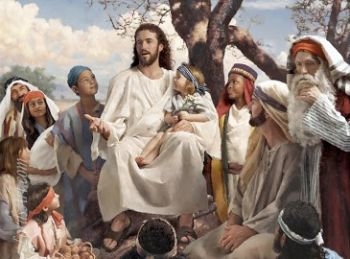
Many of us have been watching the Olympics during the past weeks. We watch the thrill of young athletes standing on the podium and having a medal placed around their necks. They are declared the greatest athletes of the moment in their area of play. We humans like to see great people and be great people. It is part of our “DNA.” All of us want to be the greatest at something, even if it is the greatest gardener in the neighborhood.
The disciples of Jesus were no different than we are. As Jesus talked about the new realm that he was establishing on earth, the Kingdom of heaven, they began to wonder who its greatest members would be (Matthew 18:1-14).
“The disciples approached Jesus and said, ‘Who is the greatest in the Kingdom of heaven?”
Was the greatest the one who knew most about the Bible, or the best preacher, or one who was best at relating to people? What criteria would God use to rank the members of his Kingdom in the order of importance?
Then Jesus did a shocking thing.
“He called a child over, placed it in their midst, and said, ‘Amen, I say to you, unless you turn and become like children, you will not enter the Kingdom of heaven. Whoever becomes humble like this child is the greatest in the Kingdom of heaven.”
Imagine how startled and perplexed the disciples were. Jesus took a small child, placed her on the “podium” of his lap and “hung the gold medal of his arms around her neck” and said here is the greatest in the Kingdom. Children were insignificant in their culture. They took last place at the table, were given the lowest jobs, and treated as second-class citizens in the adult world. Yet Jesus presents them as role models for those who aspired to be great in God’s Kingdom. Children have natural humility. They know they are dependent on their parents for almost everything. They know it is for them “to be seen and not heard.” They do not carry an air of “superiority.” Their characteristics do not reflect “greatness” in the minds of the world.
Jesus continued,
“And whoever receives one child as this in my name receives me.”
Those who represent Jesus are to give special attention and love to the little ones. Churchmen are inclined to cater to the rich and influential people of their congregations; Jesus tells them to turn their attention to the little ones. Could this be why Popes always seem to be picking up little children and embracing them? Jesus indicates that the way we treat the insignificant ones is the way we treat him. His words are so counter-cultural that it is difficult to accept them.
In this context he posed a different question to them.
“What is your opinion? If a man has a hundred sheep and one of them goes astray, will he not leave the ninety-nine in the hills and go in search of the stray?”
To a caring shepherd, which of his one hundred sheep is most important? Jesus tells us that it is the one that has wandered away from the flock and is, perhaps, in danger. The good shepherd turns all his attention to the little one who is lost. Does this not characterize the ministry of Jesus? Did he not turn his attention to the “misfits” of his day—the sinners, the lost, the hurt, and the abandoned? Jesus was always looking for the lost sheep in any crowd. Remember how he changed his travel plans and did the unthinkable by inviting himself into the home of the worst sinner in town, Zacchaeus the tax collector.
Today we are challenged to re-examine our values and to revise our opinions on what greatness really means. And what about our own greatness? Do we see our positions, accomplishments, or wealth as what defines our greatness, or do we accept our supreme identity as beloved children of the Father as what makes us truly great? In God’s eyes we are all his little children. Is there anything greater than this?
